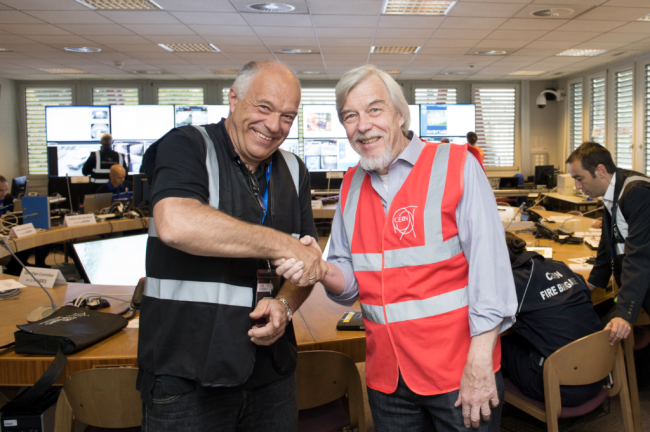This year, the CERN Accelerator School (CAS) celebrates its 40th anniversary. To look back into the history of what has now become an institution for all accelerator students, we met with Hermann Schmickler, who ran the school from 2018 to 2021. Heavily involved in the school since its early stages, the German physicist explains how the school changed since its creation in 1983.
Hermann’s journey begins early in his career. About four years after the opening of the school, in 1987, he joined CERN as a student, before earning his PhD in physics, specialising in beam instrumentation and working on LEP. As he progressed in his career – and eventually becomes the leader of the beam instrumentation group – Hermann attended several CAS courses. In 2001, he crossed the bridge and passed from student to teacher. “As a teacher, to be selected to give a subject for CAS, I personally felt as an honour.", explains Hermann. "This is, of course, a question of being known and recognised.” In 2009, he became technical director of the CLIC study, a position he held until taking over as CAS director in 2018.
One of Hermann's key achievements during his CAS directorate was the development of a new curriculum that emphasised hands-on learning and practical applications. He started participating in such schools during Daniel Brandt's CAS directorate (2003-2010). "Daniel had entrusted me with organising one of the three parallel courses, so starting from 2001, I organised the instrumentation hands-on course”. “By emphasising practical applications, the CERN Accelerator School ensured the students were well-prepared to work on real-world projects. As director, the first course I asked to review was the introductory course, the backbone of the CAS program”. Today, the introductory course includes ten hours of hands-on lessons, from instrumentation to computing, all of which are highly appreciated by the students.
This shift in focus was essential in keeping up with the ever-evolving field of accelerator physics. "Back when the school started, many of the fields that are currently dominating accelerator technology simply didn't exist. No computers. No superconducting accelerators. No superconducting radio frequency cavities. CAS has always followed these evolutions and adapted the choice of topical courses to the evolution in the field of accelerators."
Hermann also increased the number of courses per year. "I inherited a situation where the Introductory course was given one year, and the Advanced Course the next. This had severe consequences: if a newcomer at CERN came at the wrong moment, this student had to wait two years to get the opportunity to do the Introductory. So, one "must" for me was to hold the Introductory course every year (in September). And every second year in June, the Advanced one.”
The frequency of the topical courses also had to be increased. "Over the years, the field of accelerator physics got more and more complex, so we had to have more specialised courses." he continues, "One topical course per year didn’t allow us to include new subjects. Also, traditional subjects like beam instrumentation or radio frequency were given only every ten years or so. Which is, of course, not frequent enough."
Nowadays, the participants come from around the world, and the institutions and industries outside CERN are increasingly interested in the programme. "These days, the projects and accelerator domains are so big that even CERN, one of the biggest institutes, cannot do them by itself, and they should not do them by themselves. All projects are based on international collaborations. And as a consequence, one gets to know good experts from abroad who also need to train their students. So naturally, CAS has been opening up to students and teachers of other institutes."
Hermann's directorate of the CERN Accelerator School was marked by his dedication to the field of accelerator physics and his commitment to collaboration. His legacy will no doubt have a lasting impact on the CERN community and the field of accelerator physics. As the school looks to the future, it will continue to benefit from the foundation that Hermann helped to build, and his contributions will be remembered for years.

